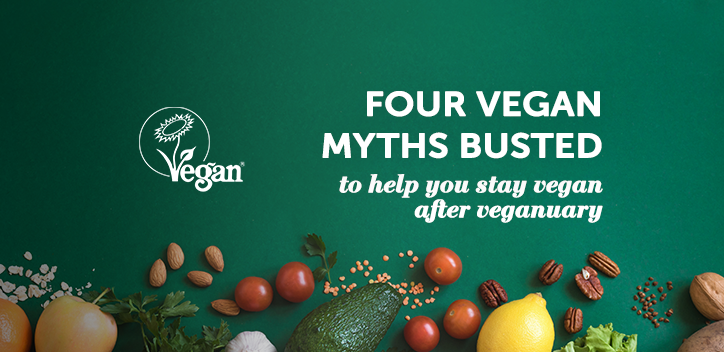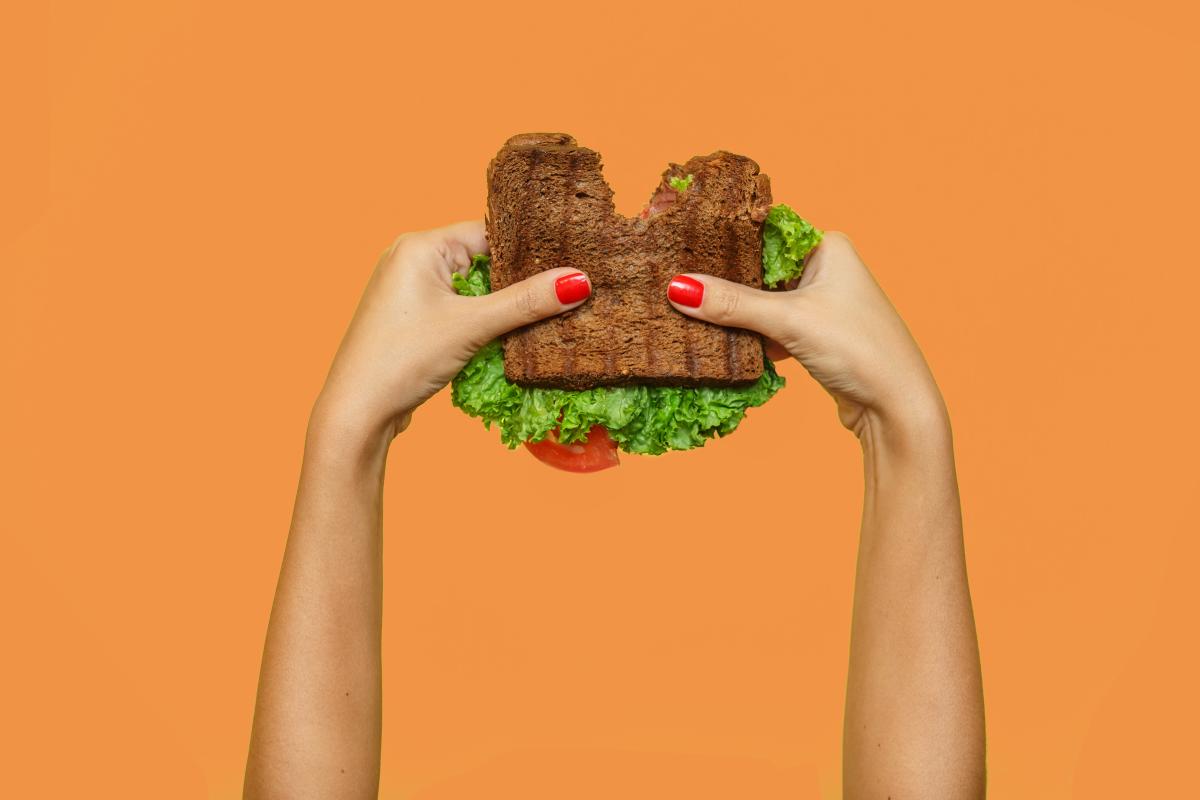Was trying out a vegan diet on your list of New Year’s resolutions? First, congratulations for making those first steps towards a lifestyle kinder to animals and the planet!

It’s not easy to make big and lasting changes, so maybe you struggled with certain vegan swaps this month because you couldn’t find the right products? Or maybe you’ve heard some vegan myths that feel insurmountable? Maybe you’ve had a great month making dietary swaps, but now learning about how many products in your life are not vegan feels like a huge and overwhelming task and you’re worried you have to throw everything out?!
Take a deep breath. The Vegan Society’s definition of veganism acknowledges that we live in a non-vegan world. If you’re just starting out, the sheer scope of the lifestyle might feel overwhelming. Remember, there is no perfect time to make a compassionate lifestyle change. If you didn’t manage to join in Veganuary this year, but you still want to shift to a vegan lifestyle, you don’t have to wait until the first month of the year – any time that feels right for you is the best time. Plus you don’t have to do it all at once! Learning how many non-vegan items are lying around your home may make you feel like you have to throw everything out and start again, but a much more sustainable way of making lasting change to your lifestyle is slowly and mindfully making considered purchases when you run out of the products you already own.
“Veganism is a philosophy and way of living which seeks to exclude—as far as is possible and practicable—all forms of exploitation of, and cruelty to, animals for food, clothing or any other purpose; and by extension, promotes the development and use of animal-free alternatives for the benefit of animals, humans and the environment. In dietary terms it denotes the practice of dispensing with all products derived wholly or partly from animals.”
If some of the above resonates with you, you may be holding some vegan myths as beliefs. So, I’m going to dispel four of the biggest vegan myths that could be holding you back from a lifestyle that is more compassionate for animals, better for the planet and, potentially, better for your health.
MYTH: ‘Vegans lack protein’
REALITY: One of the most common misconceptions about a vegan diet that we’ve all heard is that it may lack sufficient protein. However, this is far from the truth. Plant-based sources offer a wealth of protein and including a variety of these protein sources in a well-thought-out vegan diet can help you meet your body's protein requirements.
From beans, pulses and tofu, to the soy and pea-based sources of protein you can find on the shelves of the supermarket, there is an abundance of choice for you to get your protein intake. A well-planned vegan diet should include lots of different protein sources. You can find more information from our dietitians here and a range of recipes here.
Although cooking with wholefoods is the healthiest option, there are a whole host of vegan meat and fish alternatives in supermarkets that are tasty, easily accessible and are great options, especially when you’re looking to transition away from a meat-based diet. From VFC’s extensive range of vegan chick*n to Richmond’s Meat Free Burgers and Sausages, to ASDA’s Vegan Smoked No Salmon, there are exciting and innovative vegan protein products for every taste.
Look for the Vegan Trademark when shopping in stores for products! It is The Vegan Society’s certification label that makes shopping easier for you. Rather than trying to read ingredients labels yourself, if you see the Vegan Trademark, you can trust that our team of experts has checked the ingredients and manufacturing processes to verify a product is vegan. You can read more about our standards here.
MYTH TWO: ‘Vegan cheese doesn’t melt’
REALITY: Probably most vegans have heard the line ‘I would go vegan except for cheese’, and maybe some thought it themselves before they made the switch! Maybe you’ve also heard that vegan cheese alternatives don’t taste as good or that they don’t melt – we’re here to bust that myth.
Although vegan cheese definitely tastes different to what you may be used to, the knowledge that you are not consuming animal products and are choosing a much more compassionate option is helpful to remember, when motivating you to try new options. Vegan cheese has come a long way since its first attempts and there is now a staggering range of delicious vegan cheese alternatives available, and there are absolutely many marvellously melty options!
If you’re a fan of a smoky flavour, Applewood Vegan is a great option – look at that cheese pull! For a cheddar flavour (with an amazing crumbly texture), Cathedral City’s Plant Based Range is a go-to and passes the melty test with flying colours!
Why not check out our blog on Vegan Cheese and Wine Pairings for a wider range of recommendations.
MYTH: ‘Vegan diets are expensive’
REALITY: Contrary to popular belief, a vegan lifestyle can be budget-friendly. Fruits, vegetables and legumes can often be the most affordable part of a food shop and, when bought frozen or in bulk, can help cut down the cost of a vegan diet even further.
Many vegan alternatives hitting the shelves are certainly exciting, but that doesn’t mean they’re the only option for you to choose from. In fact, opting for a diet that focuses on the more cost-effective side of the supermarket and choosing your vegan alternatives wisely might actually cost you less than a non-vegan shop.
Supermarkets often have their own brand vegan products, which can help you save money on your shop. Look out for the ASDA own brand products in this list of Vegan Trademark registered groceries.
As part of our Live Vegan For Less campaign, we created a cost comparison to highlight how cheap many vegan staples really are. You can also explore some simple and affordable vegan recipes, like these banana pancakes and this crispy chow mein.
MYTH: ‘Vegans lack essential nutrients’
REALITY: We’re not quite sure where this myth came from because, with a bit of planning (which helps with upping nutrition on any diet), a well-balanced vegan diet can certainly meet all your nutritional needs. In fact, it might surprise you just how much protein, vitamins and minerals are in foods that you might not have considered before.
For example, many vegan sources of protein are also packed with other nutrients, helping you to support a diet that is filled with all the essential nutrients you need to thrive. Not only this, but there are plenty of vegan alternatives for nutrients you may have thought were only sourced from animal products, such as almond milk for calcium (e.g. Alpro’s Almond Original) and flaxseeds for omega-3 (e.g. Naturya’s Gut Feel Flaxseed Blend).
As we mentioned earlier, getting enough of the right nutrients on any diet requires a little planning. However, supplementing your vegan diet with a daily multivitamin can be a more affordable and reliable way to ensure you’re consuming enough vitamin B12, vitamin D, iodine and selenium. VEG 1, which was developed by The Vegan Society, comes in a chewable tablet and costs just over £2 a month. There’s a VEG 1 for Babies and Toddlers, too!
We hope we’ve cleared up some vegan myths you may have heard and helped you discover some new Vegan Trademark certified products while you were here. We hope you’ve enjoyed Veganuary and are excited to keep going, making compassionate swaps in your diet and beyond!
Why not join in the conversation with us on social media and share your Vegan Trademark finds with us by tagging @vegantrademark on Instagram and X (Twitter).
The views expressed by our bloggers are not necessarily the views of The Vegan Society.

